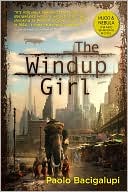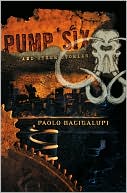 The Windup Girl by Paolo Bacigalupi is a book that I picked up because a lot of people talked about it. And because it won the Hugo and Nebula Awards.
The Windup Girl by Paolo Bacigalupi is a book that I picked up because a lot of people talked about it. And because it won the Hugo and Nebula Awards.
The Windup Girl represents a type of post-apocalyptic story that is such a fundamental part of science fiction. In this particular case, the apocalypse in question is a result of genetic engineering, specifically the manipulation of food crops. Somewhere in the two centuries preceding the novel, there has been world-wide crop failure as the bio-engineering has also resulted in pests that are resistant to the pesticides. Finally the cycle collapsed. Civilization has retrenched and sunk. Our present “Expansion” is reviled, and has become a myth. Agribusinesses are called “Calorie Companies” because that’s what they sell, calories so that people can work, and live. No one is fat, instead, people are starving.
The story is set in the city of Krung Thep, formerly Bangkok. It is told from five perspectives: Anderson Lake, an American Calorie Man; Hock Seng, a Chinese refugee; Jaidee, a captain in the Environmental Ministry Corps; Kanya, his second in command; and Emiko, the Windup Girl herself.
 The post-civilized world in this story is interesting, but there wasn’t enough story in this book to satisfy me. The narrative skipped from character to character, and none of them were people I had any sympathy for. Nor did the author allow the reader to spend enough time with any of the characters to understand their motivations. There clearly is a well-thought out background, and two of the short stories in Bacigalupi’s collection Pump Six and other stories (“Yellow Card Man” and “The Calorie Man”) are prequels for Windup. But that background isn’t in the novel, adding a layer of confusion that wasn’t needed. One of the points of the story was that every character was hiding their true motivations from everyone else. And sometimes from themselves.
The post-civilized world in this story is interesting, but there wasn’t enough story in this book to satisfy me. The narrative skipped from character to character, and none of them were people I had any sympathy for. Nor did the author allow the reader to spend enough time with any of the characters to understand their motivations. There clearly is a well-thought out background, and two of the short stories in Bacigalupi’s collection Pump Six and other stories (“Yellow Card Man” and “The Calorie Man”) are prequels for Windup. But that background isn’t in the novel, adding a layer of confusion that wasn’t needed. One of the points of the story was that every character was hiding their true motivations from everyone else. And sometimes from themselves.
The future portrayed in this dystopian tale was grim enough on its own merits. It was not necessary for the author to add to the murk by leaving so much of the backstory outside of the work in hand.







